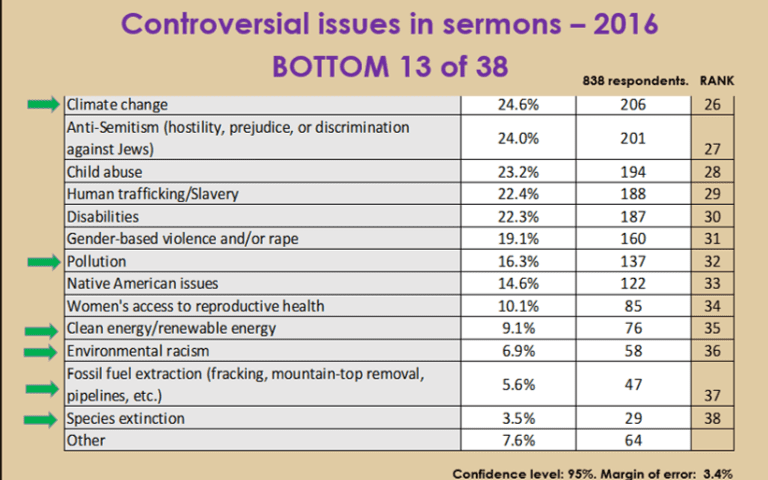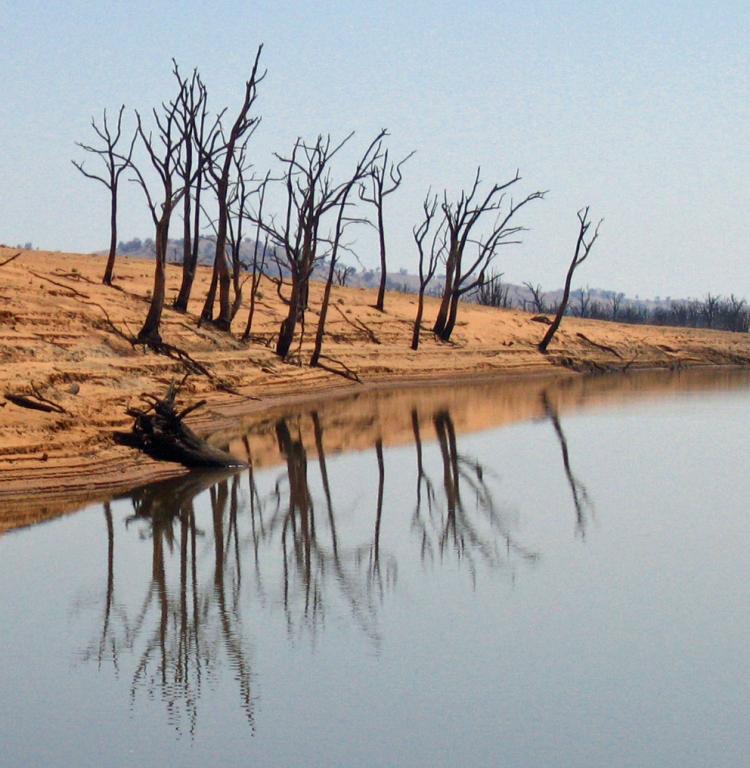The U.S. government report on the devastating effects of the climate crisis was released on Black Friday detailing what is happening now and how the situation will worsen in the years to come. Catastrophic weather events, air pollution, loss of species and habitat, ocean acidification, and rising sea levels have implications for every human being on this planet. Yet how often do clergy address environmental issues in their houses of worship?
I conducted a survey of 1200 mainline Protestant pastors in early 2017 asking about their choices of contemporary topics to address in sermons. The results indicate that environmental issues were among the lowest priority for preachers.
The environmental topics all ranked in the bottom half of the list, with only 25% of respondents indicating they had preached on climate change in the last twelve months. Further down the list, 16% had mentioned pollution, 9% clean energy, 7% environmental racism, 6% fossil fuel extraction, and only 3% had preached a sermon that mentioned species extinction.

As a seminary professor, environmental activist, and former parish pastor, I have argued that clergy have a key role in helping congregations understand environmental issues as a matter of faith and moral/ethical obligation. This was one of the main tenets of my book, Creation-Crisis Preaching: Ecology, Theology, and the Pulpit (Chalice Press, 2015). Specifically, I argued that we must pay special attention to the ways in which the oppression of those most vulnerable and the oppression of Earth are intertwined if we are to follow Christ’s mandate to care for “the least of these” in both our human and biotic communities. In this day and age, preachers must be attentive to the eco-crucifixion that is going on all around us, felt most keenly by those living in poverty, Indigenous communities, and people of color.
This Sunday marks the First Sunday of Advent in the Christian liturgical calendar and offers an ideal opportunity to address the climate crisis.
Those churches following the Revised Common Lectionary hear words of foreboding from the Gospel of Luke 21:25-36:
25 “There will be signs in the sun, the moon, and the stars, and on the earth distress among nations confused by the roaring of the sea and the waves. 26 People will faint from fear and foreboding of what is coming upon the world, for the powers of the heavens will be shaken.
What an eerie coincidence that this is the text for Sunday. The 6th great extinction, the growing “garbage patch” in our oceans, the massive die-off of coral reefs, water pollution, along with the increasing frequency of catastrophic weather events such as droughts, floods, hurricanes, typhoons, and wildfires, are all “signs” of the eco-crucifixion, the travail described in Luke’s gospel. Scientists are now debating how long the planet will remain habitable for human beings. 300 years? 100? 50? The latest report from the Intergovernmental Panel on Climate Change warns that humanity has just over ten years to get global warming under control before the cascade of catastrophic impacts overwhelms our capacity to adapt.[1]
How might we preach this text (and the entirety of Scripture for that matter) in a time of climate crisis?
First, we need to read and interpret the Bible with an eye towards how the values of compassion, assisting those in need, and holding leaders accountable to the criteria of justice all apply to the climate crisis. This passage in Luke makes very clear that in the midst of the global calamities, Jesus arrives.
27 Then they will see ‘the Son of Man coming in a cloud’ with power and great glory. 28 Now when these things begin to take place, stand up and raise your heads, because your redemption is drawing near.”
It would be a mistake to interpret this as a Superman scenario where the hero comes to our rescue.
Rather, we must interpret this passage knowing that Jesus has said how he will appear – in the form of those in need (Matthew 25:31-46). The hungry. The thirsty. The stranger. The destitute. The sick. The prisoners. In other words, “the least of these.” Understand that every one of these categories is going to swell as the climate crisis continues to grow. So, yes, Jesus is coming, but his “power and glory” are hidden within those most vulnerable. If you want to see Jesus, look for him among those in need. When we work alongside and on behalf of “the least of these,” we will indeed witness power and great glory that comes from within and from above.

This means that clergy need to seek out, listen to, and learn from a multitude of stories from a variety of locations spoken by voices previously unheard or disregarded – including the poor, threatened communities, and Earth itself – to break our hearts, change our minds, bring us to our knees in repentance, and creatively engage the climate crisis with all our strength. Clergy have a key role in joining our story to God’s story – and to Earth’s story – in a way that reveals a truth we need to hear.
This is an “all hands on deck” moment for preachers.
Our silence about climate and environmental issues is a form of theological malpractice that we must remedy. Preachers are needed to help tell these stories and activate the faith community. Research has shown that when clergy speak about climate change and other environmental issues in their sermons, people listen. Sometimes they resist. But often they respond. It makes a difference.
If you want to help lead your church during this time of climate crisis, read the government’s report with your congregation and look at how climate change will affect your region of the country. Discuss ways your church can prepare and assist during the calamities to come. Connect with your denomination’s environmental justice group to learn what resources are available to assist in your efforts. Then put together an climate justice action team to implement those strategies. As Luke’s Gospel warns:
34 “Be on guard so that your hearts are not weighed down with dissipation and drunkenness and the worries of this life, and that day does not catch you unexpectedly, 35 like a trap. For it will come upon all who live on the face of the whole earth. 36 Be alert at all times, praying that you may have the strength to escape all these things that will take place, and to stand before the Son of Man.”
In other words, there is no time left to squander our attention on things that are not priority right now.
The color of the new carpet, the “worship wars” about styles of music, even the schism-threatening sexuality debates about who gets to love and be loved – all of this won’t matter if there isn’t a habitable planet for our species and our houses of worship. For the next ten years the church must triage and put on hold those things that do not involve the survival of humanity on this planet.

I am currently co-editing a book with my colleague Margaret Bullitt-Jonas called Rooted and Rising: Voices of Courage in a Time of Climate Crisis, which will be released by Rowman & Littlefield in 2020 in time for the 50th anniversary of Earth Day. We envision this book of essays from religious environmental activists from various faith traditions as a message in a bottle to future generations. It will provide a glimpse of the various ways that people alive today find spiritual meaning and strength as they take action to stabilize the climate and to build a more equitable society. When it comes to climate change, each of our contributors has experienced what we call the “oh shit” moment of realizing how bad things really are. Yet they’ve found ways to make meaning, regain their footing, and take the next step of leadership, resistance, and organizing in this time of extraordinary planetary challenge.
Preachers – we need to do this as well.
We need to step into this present crisis to help elicit a depth of wisdom, insight, and motivation that can guide us, as individuals and as a society, toward a more peaceful, just, and Earth-honoring future. This is our challenge. This is our holy calling.
Looking for ways to open up the conversation on climate solutions, focus on common values, and help us all move forward, together? Check out Blessed Tomorrow’s Climate Talking Points.
Are you an Evangelical Christian looking for resources for how to address climate change? Check out Peterson Toscano’s podcast at Citizen’s Climate Radio, “What Does the Bible Say About Climate Change?”

Leah D. Schade is the Assistant Professor of Preaching and Worship at Lexington Theological Seminary (Kentucky) and author of the book Creation-Crisis Preaching: Ecology, Theology, and the Pulpit (Chalice Press, 2015).
Twitter: @LeahSchade
Facebook: https://www.facebook.com/LeahDSchade/
Read also:
Preaching as Resistance: Encountering Pharaoh—and Climate Change
We’ve Lost the Climate War. It’s Time to Surrender.
What Can A Person of Faith Do About Climate Change?
[1] “The world has just over a decade to get climate change under control, U.N. scientists say,” Chris Mooney and Brady Dennis, Washington Post, Oct. 9, 2018. https://www.washingtonpost.com/energy-environment/2018/10/08/world-has-only-years-get-climate-change-under-control-un-scientists-say/?utm_term=.b86605d3e05a. Accessed Nov. 13, 2018.













